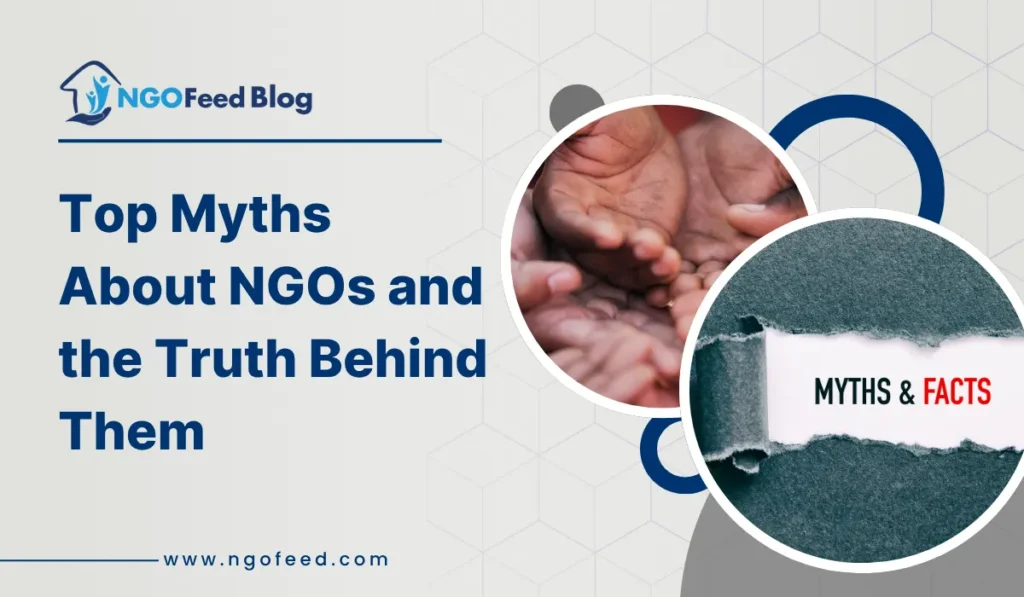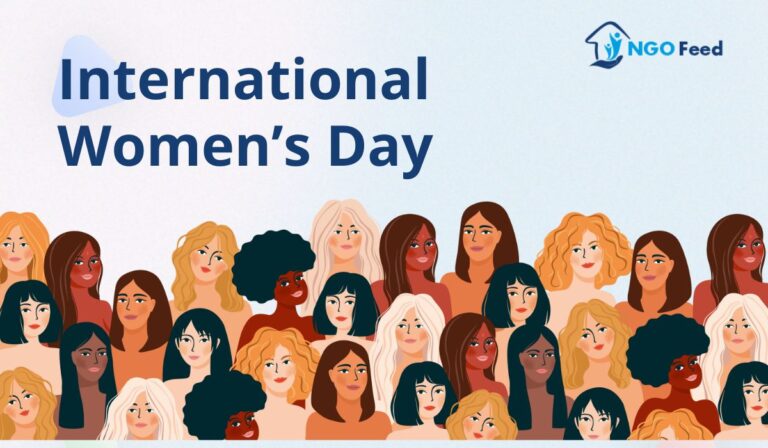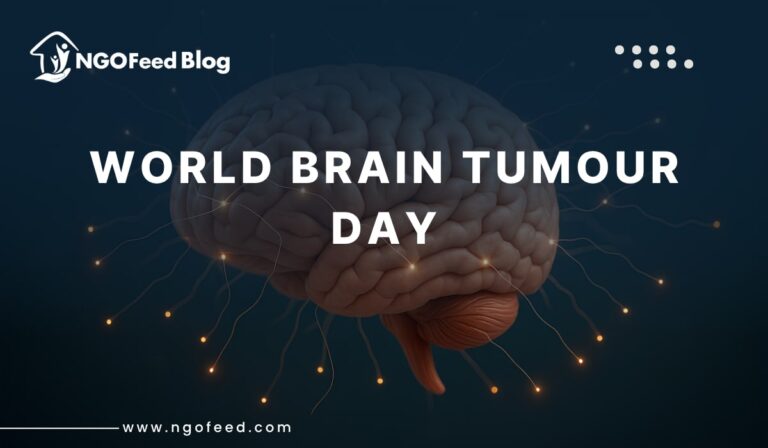Top Myths About NGOs and the Truth Behind Them: Working in fields including education, health, environment, human rights, gender equality, and disaster relief, non-governmental organizations (NGOs) are essential for societal change. NGOs are occasionally misrepresented and misinterpreted despite their help to national development. Myths and assumptions about their financing, objectives, and operation abound, so fostering public distrust and skepticism.
Separating myths from truths and grasping the reality of NGO operations is essential for raising awareness and openness.
Table of Contents
Myth 1: NGO’s Only About Charitable Giving
Fact: NGOs are not limited to donations or charity. Many NGOs participate in long-term development, advocacy, research, and policy change, even if certain groups concentrate on relief and welfare.
By affecting government policies and empowering communities, they tackle structural problems including poverty, gender inequity, and environmental sustainability. For instance, rather than mere assistance delivery, NGOs like SEWA (Self Employed Women’s Association) and Pratham emphasize economic empowerment and education.
Myth 2: NGOs Earn a Lot of Money.
Fact: Non-profit organizations are NGOs; thus, any excess monies are re-invested in social causes—not dispersed as profit.
Although NGOs get grants or contributions, these money are usually earmarked for particular initiatives and subject to rigorous financial inspections. Staff salaries are real operating expenses, not profits. Statutory audits, donor assessments, and government reporting (e.g., under FCRA or CSR rules) guarantee transparency and accountability.
Myth 3: Every nonprofit has international money.
Fact: Foreign donations go to only a small fraction of Indian nonprofits.
Out of several lakh registered NGOs, the Ministry of Home Affairs estimates that fewer than 20,000 have current FCRA registration. Most nonprofits rely on local donations, neighborhood contributions, or corporate social responsibility (CSR) alliances. Many local supporters and volunteers help to fund many small-budget grassroots NGOs.
Myth 4: NGOs Are Only Run by Volunteers
Truth: Although volunteers are quite important, most NGOs demand professional staff—including legal specialists, accountants, project managers, and social workers—to manage complicated social initiatives.
Expertise, strategy, and full-time commitment are needed to run major health, education, or environmental initiatives. NGOs therefore guarantee that services arrive at communities effectively by fusing professional efficiency with volunteer enthusiasm.
Myth 5: NGOs Are Non-Transparent or Unaccountable.
Truth: Actually, nonprofits rank among the most controlled industries in India. Registered under the Societies Registration Act (1860), Indian Trusts Act (1882), or Companies Act (2013), they have to obey a number of rules including Guidelines for income tax, FCRA, and CSR reporting.
They must have audits, submit yearly returns, and make their financial statements available to the public. To ensure transparency and donor confidence, several NGOs also freely release yearly reports and impact assessments.
Myth 6: NGOs Fight the Government
Truth: NGOs supplement the government; they are not against it. Although some NGOs promote accountability or point out policy voids, their aim is to improve governance, not subvert it. Many non-governmental organizations work with government agencies to carry out welfare programs like Swachh Bharat Abhiyan, Beti Bachao Beti Padhoa, and National Health Mission. Their work guarantees grassroots effect by connecting policy and people.
Myth 7: NGOs Work Only for the Poor
Truth:
Though many NGOs support poor people, their reach goes well beyond poverty reduction. NGOs also give attention to environmental protection, animal welfare, human rights, the humanities, education, and mental health. WWF-India, for example, deals with biodiversity; CRY concentrates on children’s rights; this demonstrates the sector’s variety beyond financial divisions.
Myth 8: Anyone Can Start an NGO Without Rules
Truth: Setting up a non-governmental organization in India entails compliance, documentation, and legal registration.
Depending on the framework, it must have financial regulations, bylaws, and a governing body whether it is Trust, Society, or Section 8 Company. Furthermore, NGOs have to get FCRA clearance from the Ministry of Home Affairs in order to receive foreign funds; this is a procedure including close examination of qualifications and aims.
Myth 9: NGO effect is limited.
Truth: In India, non-governmental organizations (NGOs) have greatly advanced education, healthcare, women’s empowerment, and environmental sustainability.
Millions of people’s lives have been changed by groups such Aga Khan Foundation, Teach for India, HelpAge India, and Smile Foundation. Their success stories show how local efforts may have significant social influence when combined with international best practices.
Myth 10: NGO staff lack professional qualifications.
Reality:
Many NGO employees have advanced degrees and particular training in social work, education, law, environmental management, or development studies.
NGOs usually use academics, teachers, physicians, psychologists, and community leaders to guarantee projects are both scientifically credible and socially appropriate. Their knowledge guarantees that social transformation is research-based and enduring.
Myth 11: NGOs abuse donations.
Fact:
Although individual cases of abuse have come to notice, these are exceptions, not the rule.
Most NGOs are audited by internal and external auditors and adhere to stringent financial guidelines. Donors—especially international organizations and CSR partners—require regular use certifications and progress reports. The FCRA structure and Chartered Accountant audits guarantee every rupee is traceable.
Myths 12: NGOs Are a Western Idea
Truthfulness:
Though the phrase “NGO” gained worldwide appeal after World War II, India has a long history of charitable action via ashrams, temple trusts, and community-based welfare organizations. Through their attitude of unselfish social service, people like Mahatma Gandhi, Swami Vivekananda, and Vinoba Bhave motivate contemporary NGOs. Therefore, Indian NGOs have strong roots in native ideals of empathy and communal well-being.
Conclusion
Civil society’s backbone is made up of nonprofits, which connect residents, private industry, and the government. From funding shortages to public perceptions, they have overcome several difficulties yet continue to serve communities with passion and resilience.
Disentangling falsehoods about NGOs is vital for raising public trust, civic involvement, and cooperative governance. As society comes to know the facts, NGOs may operate with more legitimacy and carry on their work of inclusive and sustainable development.
Frequently Asked Questions (FAQs)
1. Why are NGOs important in India?
They complement government efforts by addressing issues at the grassroots level and advocating for social justice and development.
2. How can we verify if an NGO is genuine?
Check its registration number, annual reports, FCRA status, and website. Platforms like NGO-DARPAN and GiveIndia list verified organizations.
3. Are NGOs allowed to earn income?
Yes, but only to support their social objectives. Any surplus must be reinvested into projects, not distributed as profit.
4. Do NGOs pay taxes?
Registered NGOs with valid 12A and 80G certificates enjoy tax exemptions, provided they comply with reporting norms.
5. How can the public support NGOs?
Through volunteering, donations, spreading awareness, or collaborating on community initiatives.









